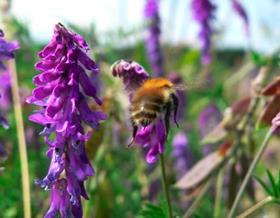
Pressure has intensified on the UK government to impose a ban on the sale of pesticides linked to bee population decline following the publication of new research in the journal Toxicology.
The study highlights the effects of neonicotinoid pesticides, which are among the most commonly used pesticides worldwide, according to The Ecologist.
It says that even low concentrations of imidacloprid and thiacloprid could be hazardous to bees due to their high persistence in soil and water.
'The acceptable limits are based mainly on short-term tests,' the author of the study, Dr Henk Tennekes, said. 'If long-term studies were to be carried out, far lower concentrations may turn out to be hazardous. This explains why minute quantities of imidacloprid may induce bee decline in the long run.'
In calling for a suspension in the use of these pesticides in the UK, conservation trust Buglife has been joined by the UK's Soil Association, which added that other products containing the pesticides should also be withdrawn from sale in UK supermarkets, hardware stores and garden centres.
'If the honeybee disappeared off the surface of the globe forever we’d be facing up to an unimaginable food crisis,' a spokesperson for the Soil Association commented. 'This latest research only adds to the evidence.'
In response to the new study, the UK department for the environment, food and rural affairs (Defra) said that the UK would not be following some other EU countries in restricting the use of neonicotinoids, The Ecologist reported.



